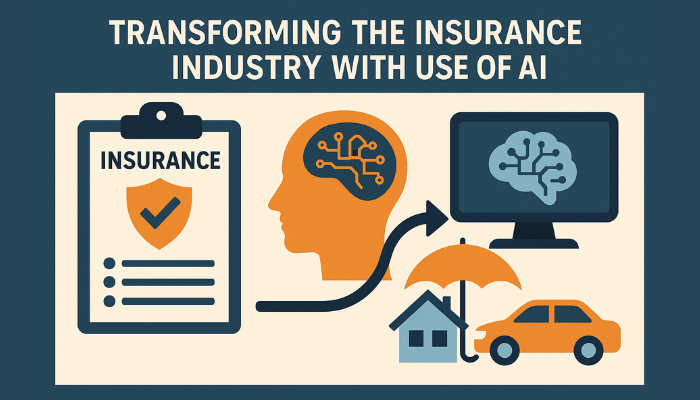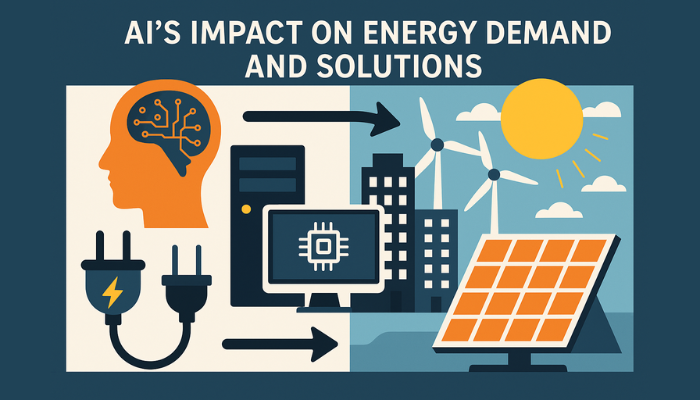Handling claims, spotting fraud, and keeping customers happy isn’t easy. That’s where AI comes in. It helps you work faster, cut errors, and offer better service. As insurance gets more digital, using AI can help you stay ahead and make smarter choices.
In this blog, you’ll learn what AI in insurance is, how it works, and the key benefits it offers. We’ll cover the best tools and platforms in the industry. You’ll also understand the main challenges businesses face when adopting AI. This blog gives you a practical knowledge of how AI is transforming insurance.
What Is AI in Insurance?
AI in insurance involves using technologies like machine learning, natural language processing, and predictive analytics to improve business operations. Rather than relying on outdated processes and data, AI helps insurance companies make faster, more accurate decisions, from underwriting to claims management.
Knowing what AI is sets the foundation. But how does it really transform your day-to-day operations? The following section shows how AI is driving meaningful results across every corner of the insurance industry.
How AI Works in the Insurance Industry
AI is quietly changing the way insurance companies work behind the scenes, making things faster, smarter, and more personal for both your team and your customers. It’s not just about automation; it’s about making everyday decisions easier and more accurate. Here are the main ways AI is being used across the insurance industry:
1. Automated Claims Processing
AI makes the claims process faster and smoother. Instead of depending on manual checks, AI systems can read claim forms, analyze documents, and even look at images to assess damage. For example, a machine learning model can scan photos of a car accident, identify the extent of the damage, and estimate repair costs in minutes. This means your customers get payouts faster, your team handles fewer repetitive tasks, and your overall claims cycle becomes more efficient.
2. Smarter Risk Assessment and Underwriting
Traditional underwriting uses broad categories like age or location to set premiums. AI enhances underwriting by using real-time data, such as driving behavior and health records, to build more accurate risk profiles. This results in personalized pricing and better policy offerings tailored to each customer’s unique needs.. This helps your business price policies more competitively, reduces risk exposure, and delivers better products to each customer.
3. Fraud Detection and Prevention
Insurance fraud can lead to massive financial losses. AI helps prevent this by spotting unusual patterns in claims or customer activity. It can detect things that human reviewers might miss, like repeat claims with similar details or inconsistencies in documentation. AI can also scan social media and other public data to cross-check information. This means you catch fraud early, protect your company’s reputation, and avoid unnecessary payouts.
4. Improved Customer Experience
AI-driven chatbots and virtual assistants are available 24/7 to answer basic customer questions, like policy information, claim status, or premium due dates. These tools give fast, accurate answers without making customers wait. AI also helps personalize communication, so each customer gets product suggestions, updates, and offers tailored to their profile. That leads to higher satisfaction and loyalty.
5. Personalized Insurance Products
AI allows you to move beyond one-size-fits-all policies. You can offer usage-based insurance, for example, car insurance that charges based on actual driving behavior, or health insurance that adapts to lifestyle data. This flexibility is especially valuable for freelancers, remote workers, and gig economy users. You meet their needs better and stay ahead of competitors.
6. Operational Efficiency and Cost Savings
AI takes over repetitive tasks like data entry, form processing, or document verification. This reduces the risk of human errors, speeds up operations, and cuts administrative costs. Your staff can then focus on strategic tasks, like growth planning, product innovation, or improving customer service, while AI handles the backend work quietly and reliably.
7. Data-Driven Business Decisions
With AI, your data becomes a powerful decision-making tool. It can identify market trends, forecast risk, and help you fine-tune pricing or product strategies. Whether you’re launching a new insurance product or managing risk portfolios, AI provides real-time insights so you can act with confidence, not guesswork.
Still relying on fragmented legacy systems that make compliance and risk management a nightmare?
With Codewave’s digitized legal and regulatory automation, you get secure, compliant systems that flag risks early and reduce operational overhead.
Also Read: AI Software Tools and Use Cases in 2025
Seeing the inner workings of AI is important, but what you truly care about is the impact. From cutting costs to driving smarter decisions, the benefits of AI go far beyond automation. Here’s how it can move the needle for your business.
Benefits of Using AI in Insurance
AI is driving real, measurable results across the insurance industry, helping you improve performance, cut costs, and deliver better experiences at every level. Here are the key benefits you can expect when integrating AI into your insurance business:
1. Enhanced Risk Assessment and Personalized Pricing
- AI helps you assess risk more accurately by analyzing large sets of real-time data, from customer behavior and property records to environmental trends.
- This allows you to price policies based on actual risk, not just broad categories, making premiums more accurate and fair.
- With dynamic pricing, you can adjust premiums as risks change, helping you stay competitive and protect your margins.
2. Streamlined Operations and Cost Efficiency
- AI automates routine tasks like form processing, claims handling, and data entry, saving time and cutting overhead.
- Underwriting tools and AI-powered claims systems speed up processing times, moving from weeks to just a few hours.
- These gains reduce operational costs and free up your teams to focus on strategy, growth, and customer service.
3. Faster, More Accurate Claims Processing
- AI speeds up every step of the claims process, reviewing documents, checking damage through images, and approving settlements.
- Virtual assistants and chatbots can answer routine queries and guide customers through claims 24/7, without needing extra staff.
- This leads to quicker payouts and a smoother experience for your customers.
4. Advanced Fraud Detection and Risk Management
- AI monitors data in real time and detects unusual patterns that could indicate fraud, such as duplicate claims or false documents.
- It can even check public sources like social media to validate information.
- This helps you act early, reduce fraud losses, and maintain trust with honest customers.
5. Improved Regulatory Compliance
- With frequent regulatory changes, AI helps you stay compliant by automating checks and reporting.
- It flags potential compliance issues as they arise, helping you avoid penalties and respond quickly when rules change.
6. Superior Customer Experience and Retention
- AI makes it easy to offer personalized service, tailoring product recommendations, pricing, and communication to each client’s needs.
- 24/7 AI support ensures customers get answers anytime, which boosts satisfaction and loyalty without increasing your headcount.
7. Scalability and Competitive Edge
- AI gives your business the ability to grow without adding new resources.
- You can handle more data, more customers, and more transactions while keeping operations lean.
- Early use of AI also helps position your brand as innovative and future-ready, keeping you ahead of InsurTech disruptors and evolving market demands.
Also Read: Understanding Generative AI and Its Impact on Business
Once you’re clear on the value AI brings to your insurance business, the next step is choosing the right tools to make it happen.
Best AI Tools & Platforms in the Insurance Industry
Below are five powerful AI platforms that are helping insurers, brokers, and agencies like yours improve efficiency, reduce costs, and deliver standout customer service in 2025.
CloudTalk
CloudTalk is an AI-powered calling and communication platform tailored for insurance businesses that manage a high volume of customer interactions. Whether your team handles policy inquiries, claim updates, or lead generation, CloudTalk helps simplify and speed up your phone operations. It improves agent performance, call quality, and overall service delivery.
Key Features Explained:
- Conversation Intelligence AI: This feature records and analyzes conversations to highlight performance gaps and coaching opportunities. You can use it to train agents, improve client interactions, and ensure compliance.
- Intelligent Call Routing & IVR: Calls are automatically directed to the right department or person based on caller input, reducing hold times and improving first-call resolution.
- Smart & Power Dialers: These dialers help your sales or support team make more calls in less time by eliminating manual dialing and skipping voicemails.
- Real-Time Analytics & Monitoring: Access live dashboards and reports to track call volumes, agent availability, and customer wait times for faster decision-making.
- 3rd Party Integrations: Connect CloudTalk with CRMs like Salesforce or HubSpot to view client histories, automate workflows, and avoid data duplication.
Kenyt.AI
Kenyt.AI provides intelligent chatbots built specifically for the insurance sector. It handles everything from lead generation to policy FAQs and even claim updates—all without human intervention. This tool is ideal for agencies looking to scale their customer service operations while keeping overhead low.
Key Features Explained:
- AI Chatbot with NLP: The bot understands natural language and responds like a human. It can answer complex policy questions, collect data, and direct users to the right service.
- Automated Claims Submission: Customers can submit claim details through the chatbot, which is then routed for processing, cutting down on paperwork and support calls.
- Real-Time Claim Tracking: Users can instantly check the status of their claims through the bot, reducing the need for follow-up emails or calls.
- Lead Generation & Policy Matching: The chatbot qualifies website visitors and recommends the right products based on their inputs, helping you convert traffic into clients.
- CRM Integration: Syncs with your CRM to update contact details, lead stages, and claim records automatically.
AlphaChat
AlphaChat is a no-code AI chatbot builder designed for insurers who want to enhance support and automate workflows without hiring developers. Its strength lies in delivering secure, multilingual, and customizable customer interactions that evolve with user needs.
Key Features:
- Self-Learning AI: The chatbot gets smarter with each interaction, improving its accuracy and tone to offer better service over time.
- Secure Authentication: You can safely let customers access their accounts, policy data, or file claims by verifying their identity directly through the bot.
- Claims Automation: The bot can guide customers through the claim-filing process, saving both time and administrative resources.
- Multilingual Support: Serve a diverse customer base by communicating in multiple languages without the need for additional human agents.
- Custom Conversation Flows: Build and modify chat paths to fit your brand voice, service strategy, or campaign goals, all without coding.
Gradient AI
Gradient AI is designed to improve risk assessment and claims processing using deep industry-trained machine learning models. It’s highly valuable for insurers who deal with complex data sets and need to make underwriting or claim decisions faster and more accurately.
Key Features:
- AI Risk Assessment: The platform uses internal and external data, like medical history or accident reports, to create detailed risk profiles for more accurate underwriting.
- Automated Claims Processing: Claims are analyzed and processed using predictive models, significantly cutting down approval time and reducing the chance of manual errors.
- Fraud Detection Tools: By comparing real-time claims data with known fraud patterns, the platform flags unusual behavior for early intervention.
- Seamless Integration: It connects easily to your existing tech stack (core systems, databases, CRMs), reducing onboarding time.
- Custom AI Models: You can tailor the models to your company’s specific risk appetite, customer demographics, or market focus for even more precise results.
Shift Technology
Shift Technology is built specifically for claims automation and fraud detection. It offers insurance carriers a smarter way to detect, prevent, and respond to fraudulent claims while speeding up legitimate ones.
Key Features:
- Claims Automation: Automates the review and approval of straightforward claims so your adjusters can focus on more complex cases.
- Machine Learning for Fraud Detection: Identifies suspicious claims by comparing them with known fraud patterns across millions of data points.
- Real-Time Risk Scoring: Gives each claim a risk score instantly so your team knows which ones to review manually.
- Plug-and-Play Integrations: Designed to work with most policy management and claims software platforms without needing a full rebuild.
- Predictive Analytics: Detects fraud trends before they cause large-scale losses, allowing proactive action.
Struggling with slow, outdated claims processes that frustrate your customers and drain internal resources?
Codewave’s AI-led claims and settlement automation helps you move from manual delays to real-time decisions, cutting costs and improving customer satisfaction.
While these AI tools offer powerful capabilities for transforming insurance operations, adopting them isn’t always seamless. Many insurers face real-world hurdles that can slow down or complicate implementation. Let’s explore the key challenges and how to overcome them.
Challenges in Implementing AI in Insurance
While AI brings massive opportunities to the insurance industry, implementing it successfully isn’t always straightforward, especially when you’re leading operations, strategy, or transformation. The following are the biggest challenges you’re likely to face, along with practical ways to overcome them.
1. Data Quality and Availability
AI systems depend on high-quality data to function properly. But many insurance companies operate with data that’s scattered across different systems, outdated, or incomplete. This makes it difficult for AI models to deliver accurate results, whether it’s for pricing, claims, or risk evaluation.
Solution:
Before deploying AI, focus on building strong data foundations. Start by cleaning up your data, removing duplicates, filling gaps, and correcting errors. Centralize your data in one system and establish a data governance process. You should also consider tools that automatically detect poor data quality, making it easier to fix issues early and often.
2. Integration with Legacy Systems
Your existing core systems may be outdated and not built to work with new AI tools. Replacing them entirely is expensive and risky, but without integration, you can’t fully benefit from AI.
Solution:
Take a phased approach to integration. Use APIs (application programming interfaces) or middleware to connect AI solutions to your current systems without breaking your operations. Opt for cloud-based AI platforms that are easier to deploy and can scale with your business. This way, you modernize without major disruption.
3. Skills Gap and Talent Shortage
AI requires expertise in machine learning, data science, and analytics, but these skills are rare in most insurance companies. Without the right people, your AI project may stall or fail to deliver ROI.
Solution:
Invest in training your existing teams through online courses, certifications, or in-house learning programs. Bring in experts on a project basis or partner with AI solution providers who can guide your team. Also, consider hiring a few specialists to lead key areas and gradually build internal capabilities.
4. Data Security and Privacy Concerns
Handling sensitive customer data through AI raises the risk of data breaches, misuse, or non-compliance with privacy laws. This can damage your reputation and lead to legal penalties.
Solution:
Strengthen cybersecurity by implementing advanced encryption, multi-level access controls, and regular system monitoring. Make sure your AI systems comply with laws like HIPAA or GDPR, depending on your market. Conduct regular risk assessments and update protocols as new threats emerge.
5. Algorithmic Bias and Lack of Transparency
AI models can unintentionally favor or discriminate against certain customer groups. If you can’t explain how AI reaches its decisions, customers and regulators may lose trust in your processes.
Solution:
Use explainable AI tools that clearly show why a decision, such as claim denial or premium amount, was made. Conduct bias audits regularly to identify and correct any unfair patterns. Build internal oversight through ethical AI committees or guidelines to ensure responsible use.
6. Customer Trust and Adoption
Some customers may not feel comfortable with AI-based decisions, fearing a lack of human judgment or transparency. This hesitation can impact adoption, satisfaction, and retention.
Solution:
Be open with your customers about how AI supports your processes. Clearly communicate benefits like faster service and fairer pricing. Always combine AI tools with human support, especially for sensitive issues like claims or complaints. This helps keep the experience empathetic and balanced.
AI adoption in insurance isn’t without its complexities, but you don’t have to face them alone. The right partner brings clarity, capability, and a clear roadmap. Let’s explore why Codewave is built to lead your transformation successfully.
Why Codewave Is the Right Partner for Your AI-Led Insurance Transformation
When you’re leading digital change in the insurance industry, you need more than just tools; you need a partner who understands the complexity of your systems, your customer expectations, and your compliance landscape. That’s where Codewave comes in.
At Codewave, we help hyper-connected insurance ecosystems come together to serve people better through intelligent, integrated solutions. Our approach starts with understanding your core business objectives and tech infrastructure. From there, we design a digital and data strategy that supports both short-term wins and long-term growth.
Here is how we help insurance businesses like yours lead with confidence:
- Custom Policy Management Software: We develop personalized software to simplify policy administration and management, making it easier for your teams to work efficiently.
- Digital Claims and Policy Issuance: Our solutions help you digitize the entire insurance process, from issuing policies to settling claims, reducing paperwork, and speeding up customer service.
- AI-Driven Claims and Settlement: Using AI and machine learning, we streamline the claims process to make settlements faster, more accurate, and less manual.
- Automated Legal and Regulatory Compliance: We build secure systems that automate compliance checks, helping you stay ahead of changing regulations without added effort.
- Fraud Detection with Blockchain: Our fraud prevention solutions use blockchain and AI to identify suspicious activities in real time, reducing risk and improving trust.
- Telematics-Based Insurance Software: We create smart software systems that use real-time driving data to offer usage-based auto insurance, helping you personalize pricing and policies.
- Exposure Management Tools: Our advanced platforms help insurers evaluate risk exposure more accurately, making risk decisions faster and more reliably.
- Applications for Agents and Brokers: We build intuitive apps that empower your agents, brokers, and policy sellers to manage their work with greater speed and flexibility.
- Peer-to-Peer Insurance Solutions: If you’re exploring P2P insurance models, we can help you build fully digital, secure, and scalable applications.
- Data Analytics: Turn your data into actionable insights with our customized analytics tools, designed specifically for insurance providers.
- End-to-End Insurance Software Solutions: From planning to deployment, we offer full-cycle development services to meet your digital transformation goals.
Ready to take the next step in transforming your insurance business with AI?
Contact us now to schedule a free consultation!
Codewave is a UX first design thinking & digital transformation services company, designing & engineering innovative mobile apps, cloud, & edge solutions.







